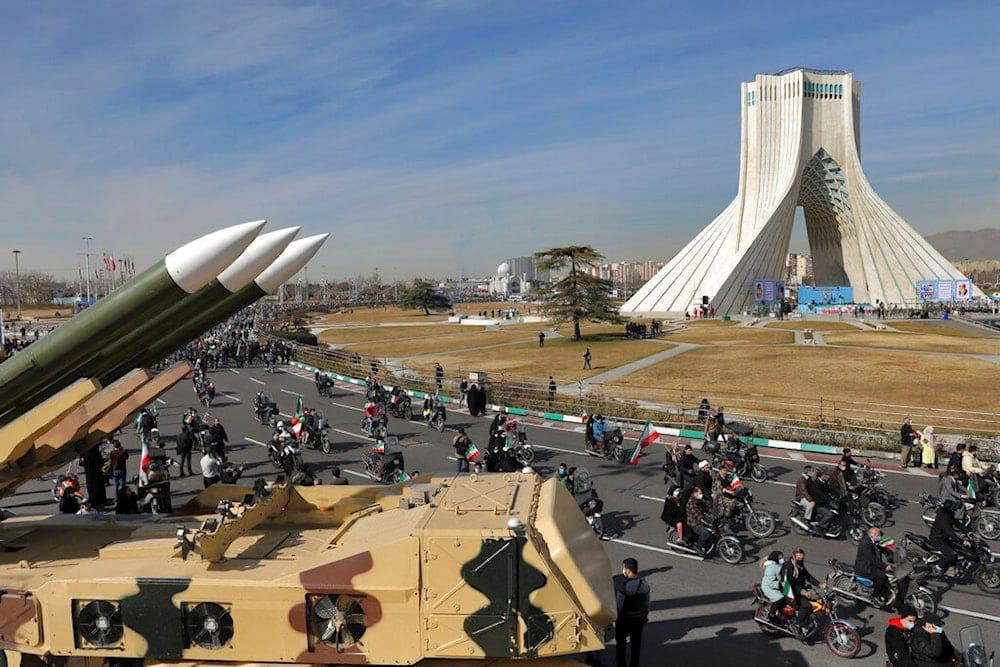Russia says relations with Iran are strategic, non-negotiable
Russian envoy Alexey Dedov says Moscow won’t bow to foreign pressure over ties with Tehran, calling Iran a key strategic partner amid sanctions.
-

Iranians drive past missiles by their motorcycle during a rally marking the 42nd anniversary of the Islamic Revolution, at Azadi (Freedom) Square in Tehran, Iran, Wednesday, February 10, 2021 (AP)
Russia’s ambassador to Tehran, Alexey Dedov, reaffirmed that relations between Moscow and Tehran are strategic and among the top priorities of Russian foreign policy, emphasizing that Russia will not bow to foreign pressure or seek an alternative to its partnership with Iran.
In an interview with Iran’s Fars News Agency, Dedov stated that Russia does not recognize restrictions resulting from the “snapback” mechanism and will not participate in forming any sanctions committee against Iran, adding that Moscow “does not see the trigger mechanism as having been activated.”
He underscored that military cooperation between the two nations follows international law and has never targeted any third party. Dedov further highlighted that nuclear cooperation is progressing “excellently,” especially in the construction of the second and third units of the Bushehr nuclear power plant, despite the sanctions imposed on both countries.
Regarding Syria, Dedov noted that there are realistic prospects for deepening relations between Damascus and Tehran, particularly in the economic sphere, adding that Russia will support this trajectory with practical steps once projects reach the implementation phase.
He explained that the Syrian file was central to recent talks between Russian envoy Alexander Lavrentiev and Iranian officials in Tehran, pointing out that the visit of Syrian President Ahmad al-Sharaa to Moscow was positive and demonstrated Damascus’s full readiness to strengthen ties with Russia.
'Strong trilateral cooperation' between Iran, Russia, China
Dedov also stressed that Moscow is fully prepared to facilitate the normalization of relations between Iran and the United States, should favorable conditions arise. He reaffirmed, however, that the trilateral cooperation between Iran, Russia, and China remains “very strong and ongoing.”
The Russian envoy concluded by noting that Moscow and Tehran share closely aligned positions on regional developments, particularly the situation in Gaza, and that both “strongly condemn the violence and bloodshed committed against the Palestinian people.”
The remarks come shortly after the Comprehensive Strategic Partnership Agreement between Russia and Iran officially entered into force on October 2, which the Russian Foreign Ministry described as a “significant milestone” in the history of bilateral relations.
Russia, Iran reaffirm ties
Iran's Foreign Minister, Abbas Araghchi, met with Alexander Lavrentiev, the special representative of the Russian President for Syria, with both sides reaffirming their commitment to Syria's unity and their rejection of any attempt to exploit the nuclear agreement to reimpose sanctions.
During the meeting, Araghchi expressed his appreciation for Russia's firm and principled positions at the Security Council, particularly its rejection of exploiting the nuclear deal's dispute resolution mechanism to reimpose the terminated resolutions concerning Iran's nuclear dossier.
For his part, Lavrentiev affirmed the importance of the strategic partnership between Iran and Russia, while also stressing the necessity of continuing consultations between the officials of both countries on regional and international issues.
As Western capitals escalate pressure, Tehran is strengthening partnerships with Russia, China, and members of the Non-Aligned Movement (NAM) to counter what it views as illegal coercion. Araghchi said that the three countries are coordinating "to neutralize the European Union's unilateral actions" and to preserve genuine multilateralism.

 3 Min Read
3 Min Read








